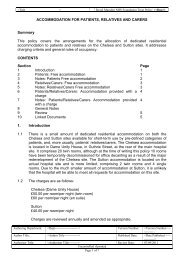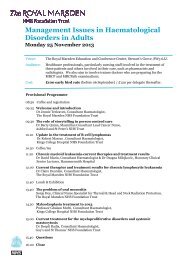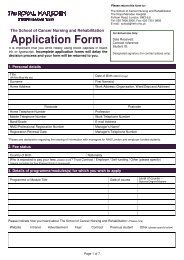RM Magazine - autumn 2012 - The Royal Marsden
RM Magazine - autumn 2012 - The Royal Marsden
RM Magazine - autumn 2012 - The Royal Marsden
You also want an ePaper? Increase the reach of your titles
YUMPU automatically turns print PDFs into web optimized ePapers that Google loves.
Cancer focus<br />
Drug research<br />
Ovarian and endometrial developments<br />
a research team led by Dr Susana Banerjee,<br />
Consultant medical Oncologist at <strong>The</strong><br />
<strong>Royal</strong> marsden, is now offering a portfolio<br />
of Phase i–iii clinical trials for patients with<br />
gynaecological cancers. <strong>The</strong> two most<br />
promising areas are in the treatment of<br />
ovarian cancer with the development of<br />
the drug bevacizumab – also known as<br />
avastin – and PaRP inhibitors.<br />
avastin works by attacking the blood<br />
vessels that feed cancers and allow them to<br />
spread. Phase iii trials have shown that by<br />
combining this drug with chemotherapy and<br />
continuing it afterwards, the time before the<br />
cancer progresses is increased, as is the<br />
survival rate in patients at high risk of relapse.<br />
Dr Banerjee says: “This breakthrough is<br />
very exciting and means there are more<br />
treatment options for patients. This drug is<br />
available to patients with ovarian cancer as<br />
first-line treatment through the Cancer Drugs<br />
Fund, and patients with recurrent disease are<br />
offered avastin at <strong>The</strong> <strong>Royal</strong> marsden.”<br />
Clinical teams in the gynaecology and<br />
Drug Development units, with scientists at<br />
the hospital’s academic partner, <strong>The</strong> institute<br />
of Cancer Research (iCR), have pioneered the<br />
development of PaRP inhibitors. This class<br />
of drug has shown promising activity, in<br />
particular in patients with ovarian cancer<br />
who have the BRCa gene mutation.<br />
PaRP inhibitors work by selectively killing<br />
cancer cells while sparing healthy ones.<br />
Patients are currently being recruited to<br />
clinical trials of PaRP inhibitors (such as<br />
olaparib) at <strong>The</strong> <strong>Royal</strong> marsden.<br />
Personalised treatment<br />
Dr Banerjee and her team have also launched<br />
a programme to collect tumour and blood<br />
specimens from patients to test for molecular<br />
abnormalities linked to their cancer.<br />
She says: “This approach aims to help<br />
guide treatment for individual patients and<br />
help women diagnosed in the future.”<br />
Cancer treatments for ovarian and<br />
endometrial (uterus) cancers continue to<br />
develop as understanding improves of what<br />
distinguishes cancer cells from normal cells.<br />
it is now known that the molecular make-up<br />
of various subtypes of gynaecological<br />
cancers differ, meaning that some patients<br />
will respond more positively than others to a<br />
Dr susana Banerjee<br />
talks to a patient<br />
helen Taylor, cyberKnife<br />
Lead radiographer, and<br />
Dr alexandra Taylor<br />
14 <strong>RM</strong> magazine

















